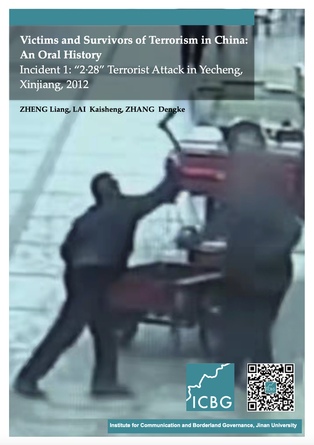
The cover is a screenshot from the surveillance video.
Victims and Survivors of Terrorism in China: An Oral History
Incident 1: "2·28" Terrorist Attack in Yecheng, Xinjiang, 2012
ZHENG Liang LAI Kaisheng ZHANG Dengke
———————
Table of Contents
Introduction
Foreword
Incident Background
Victims and Survivors
Afterword
———————
Introduction
Based on specific research purposes, oral history is a research method that uses textual, audio, and video recording to collect, organize and preserve the oral historical memories of the interviewees. To ensure the continuity and internal logic of the historical events described by the interviewees and to facilitate reading, the research group edited the transcription of original oral content in a meaningful way while remaining faithful to the facts. The editing was not intended to be subjective guidance or intervention but rather to play the role of a quality gatekeeper of the oral materials. By deleting the repetitive and meaningless words and phrases appropriately, the individual memories of the interviewees are turned into coherent information, provides additional information for restoring the history, and gives the academia more historical resources and supplementary information for future research.
To present a more realistic narrative process, the report preserves those colloquial expressions of the interviewees, hoping to reflect the most real emotions and feelings of the interviewees to the greatest extent. In addition, since those victims and survivors suffered different psychological trauma and the terrorist attack happened a long time ago, their memories may be blurred, and there may be slight discrepancies between the contents of their narration and the objective facts. Out of respect for the victims and survivors, and due to the limitations of existing historical records, we did not verify and adjust each and every one of those discrepancies.
All contents in this report were released with the consent and authorization of our interviewees.
Institute for Communication and Borderland Governance, Jinan University
Foreword
Terrorism is the common enemy of humanity. Incomplete statistics show that from 1990 to the end of 2016, thousands of terrorism incidents happened in Xinjiang, a great number of innocent people were killed, and hundreds of police officers died on duty. The property losses could not be estimated.
In all the terrorist attacks over the past two decades in China, the victims and survivors were all ordinary people like us, the only difference being that at some point in their lives, they suffered an unexpected tragedy that forcibly changed or stopped their lives. All the misfortunes and traumas were imposed by the terrorists, and they never had a choice. In the past, whenever a terrorist incident occurred, some Western media excessively focused on the personal experience of the terrorists or even defended their cruelty, which to some extent has portrayed the terrorists as the victims. In contrast, the stories of the real victims were left unheard. Terrorism is always evil and against humanity, which can never be distinguished into good terror and bad terror. Any attempt to deny the fact of terrorism, or to make an excuse for or even justify the barbarity of terrorists, is a secondary injury to terrorism victims and survivors and a brutal trampling on their human rights.
Behind these terrorist incidents are all living men and women harmed by terrorism, and their experiences are filled with blood, tears, resentment, and regret. What happened to them? What impacts and trauma did the terrorist attacks have on their lives?
As survivors and victims, how do they perceive terrorism? After the terrorist attacks, how have their lives changed over these years? These questions are worth our thinking. The Institute for Communication and Borderland Governance at Jinan University started 2021 a research project named Victims and Survivors of Terrorism in China: An Oral History, hoping that the project can help to fill the gap in this field, bringing more scholars and the public the stories of victims and survivors' community, and forging a better understanding of the barbarity of terrorism. The project is also expected to keep a unique historical record for the future.
It has been two years since we started this project, from the basic research and leads collection in the early stage to the mid-term fieldwork and the final face-to-face interviews. During the project, interviewees (victims and survivors) have raised various concerns and requests, such as requesting anonymity, refusing to be interviewed for personal reasons, terminating the interview midway, and contacting us a few days later to withdraw from the project and delete all relevant records. The research group fully respected all these requests and concerns.
We would like to extend our heartfelt respect and gratitude to all the individuals and departments that have helped us along the way, especially the victims and survivors who agreed to participate in this project. At the same time, we would also like to issue an open call of participation to the whole society: if you are one of the victims or survivors of terrorist attacks in or outside of China and are willing to share your story with us, please feel free to contact us via email: o_icbg@jnu.edu.cn
Incident Background
At 6 p.m. on February 28, 2012, terror struck Xingfu Road pedestrian street in Yecheng, Kashi Prefecture in southern Xinjiang. Failing to realize their original plan to attack the students leaving the nearby elementary and middle schools that day, nine terrorists brutally hacked and killed the pedestrians, shopkeepers, and other innocent people in the Xingfu Road market, killing 13 and injuring 16 at the scene (two of them died in the emergency room). One terrorist was captured at the scene by the police, seven were shot dead, and one was wounded and later died. Below is the link to the news covered by CNTV: http://news.cntv.cn/china/20120327/105503.shtml
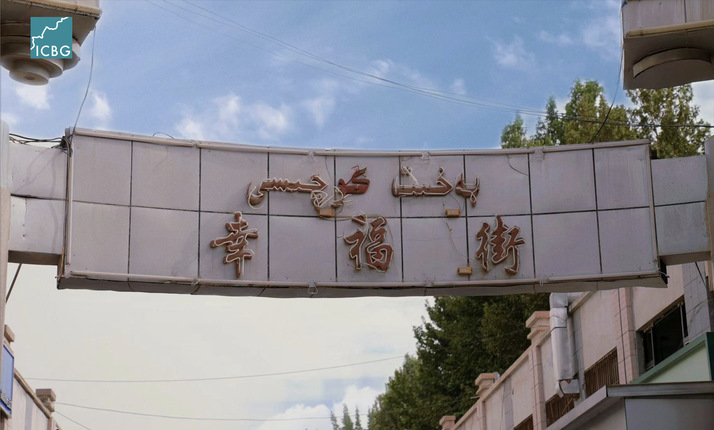
Report Background
This report is the first installment of Victims and Survivors of Terrorism in China: An Oral History by the Institute for Communication and Borderland Governance at Jinan University. Based on the narration of the victims and survivors, this report aims to restore the terrorist attack that occurred in Xingfu Road Pedestrian Street, Yecheng, Kashi Prefecture, on February 28, 2012 (hereinafter referred to as the 2·28 incident).
The report is written by ZHENG Liang (Director of Institute for Communication and Borderland Governance, Jinan University), LAI Kaisheng (research fellow at Institute for Communication and Borderland Governance, Jinan University) and ZHANG Dengke (visiting research fellow at Institute for Communication and Borderland Governance, Jinan University). XIA Qing and XU Chenghao designed this report. GUO Ziyang assisted translation.
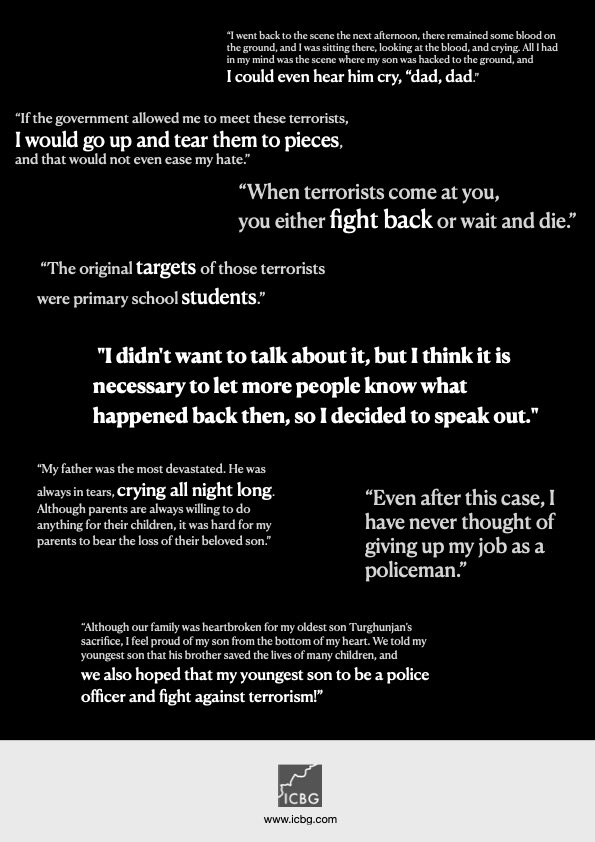
Victims and Survivors
Date of Interviews: July 2022
01 WANG Tiancheng
Owner of a grain & cooking-oil shop on Xingfu Road in Yecheng
02 Tursun Talip
Father of Turghunjan (deceased auxiliary police officer)
03 Mehmet Tursun
Younger brother of the deceased Ubulqasim
04 CHEN Jizhong, CHEN Jide,
Store owners on Xingfu Road, Yecheng, Kashi
05 Semet
A police officer who was at the scene
01
WANG Tiancheng
Owner of a grain & cooking-oil shop on Xingfu Road in Yecheng
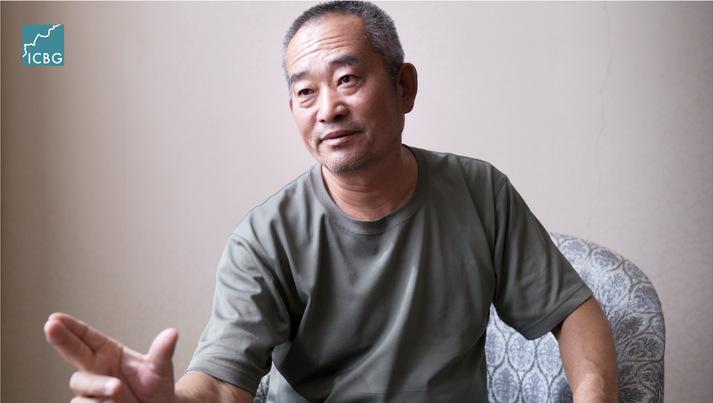
I Personal Background
I am WANG Tiancheng. I was born in 1963 and am 59 years old now. My ancestral home is Nanyang in Henan province, but I was born and raised in Yecheng. I have lived here for decades. I used to work in the grain department of the county, but I started my own business in 2002. I have only one child who lives in Kashi.
It’s been twenty years since my wife and I opened our grain & cooking-oil shop on Xingfu Road together. The storefront was rented till 2007, and then we bought it. Doing the grain business is challenging. Since we began our business, our profit margin has been very thin. We manage our business by ourselves, including purchasing, selling, and even logistics. But, tired and hard as it may be, we have come through.
II Recalling the Incident
On February 28, 2012, I was a bit dull after getting a week of intravenous fluids. I was sitting across the storefront at four o'clock in the afternoon. Then, at five o'clock, my wife was going out for vegetables, and she asked me to stop sitting there, so I chose to stand in front of the store instead. It was not yet six o'clock, just around 5:50 p.m. It suddenly became chaotic around me, but as the market was full of people every day, I didn't pay much attention. Then, I saw staff working at the market development center running and screaming, and I thought, what's going on?
At that moment, I was standing with my back to the back door and facing the entrance (of the market). Then I felt like someone had hacked me. I felt it, but I still had no idea what was happening. After the first hack, two people (the terrorists) turned directly to my front. They (terrorists) were holding an ax in one hand and a machete in another, and their axes were so big, and the hafts were so long. So, they hacked me with their machete right on my head and shoulder. Later, when I got my wounds examined, the doctor told me that this bone on my shoulder would have been broken if his machete had gone half a centimeter deeper.
I didn't expect a terrorist attack, but the terrorists came prepared. We were just one pavement brick (measured sixty by sixty centimeters on the ground on Xingfu Road ) away from each other. At that time, there was a chair I usually sat on in front of me, and it was all made of wood, so it was relatively heavy. When I saw what the terrorist was holding, my first thought was, Oh no, he's going to kill me. At the same time, I realized that at least I should fetch something in my hand to block his attack. I was unarmed, so I grabbed the chair, and his ax was coming at me at the same time. I smashed the chair on him immediately. I was wounded here when he was hacking at me haphazardly, but luckily the rest of my body didn't get hurt. If I had not blocked or reacted slower, the consequences would have been much more severe.
He (the terrorist) looked very fierce. A glance at his eyes would undoubtedly freak out someone with a weak mentality. When I realized what happened after I was hacked, I first grabbed the chair to fight back. He didn't want a fight, so when he found that I wanted to fight him back, he immediately ran away to avoid confronting me. I guess it was because I got something in my hand. He would have continued to attack me if I had been unarmed. He only wanted to kill people, so he slashed directly at people's necks or heads. If he failed to kill someone, he would immediately walk away and restart his killing when he found someone unarmed.
I was almost unarmed except for the wooden chair in front of me. Things would be different if I had any real weapon in my hand. When terrorists come at you, you either fight back or wait and die.
After attacking me, they went away to hack other people, I was afraid that the terrorists would come back, so I left from the back door, heading towards the seed company to the right. They hacked people in the middle of the Xingfu Road market, then they turned back and attacked people in the opposite direction, and I suddenly found that I had no weapon in my hands! So, I crossed the road. The police car came to the scene later, and I took their car to the People's Hospital.
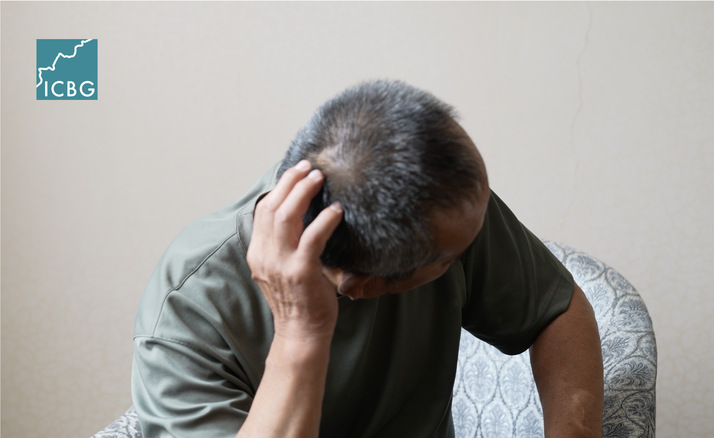
WANG Tiancheng is showing the wound on his head.
There used to be a grain & cooking-oil shop next to us, and more people were killed there. The owner returned to his store after making a payment in the bank. As soon as he came back, he was hacked into the temple and killed. And two people working at his store were also hacked to death by the door. There was an old couple buying things with their grandson in the store, the old man was killed on the spot, and the old lady was hacked right on the head when she was trying to protect her grandson. And she was hemiplegic after the attack. I shared a hospital room with her. We spent a whole week in the emergency room. Half of her body became hemiplegic, and she was unable to move.
An auxiliary police officer was hacked to death. I heard that the police officer was on duty at the back door of Xingfu Road, directing traffic in the middle of the road. He found those people (the terrorists) suspicious, so he went over to check their ID cards and was hacked to death in the middle of the road. I'm not sure how the terrorists attacked him. I saw his body in the hospital. His blood dried up, and he could not be saved anymore. His carotid artery was hacked open. The wound was very deep. The terrorists just wanted to kill him outright. He was the first person killed by the terrorists that day.
A 60-year-old woman was sitting in front of a rice noodle shop across the street when three terrorists hacked her jawbone with an ax. Her son was the owner of that rice noodle shop. When he heard his mother screaming, he came down directly with a kitchen knife and fought against the terrorists. It was a fight between him and three terrorists. The most severe wound he got was the one at his carotid artery. Fortunately, it was not fatal. He was injured with a dozen wounds in his eyes, face, and head, but he and his mother survived. His mother was sent to Kashi for osteosynthesis and survived.
And there was another guy who worked across the street from me. His skull was hacked open but not broken into pieces. The hospital's treatment was to cover the wound with a plastic cover and sew his scalp back on. And I saw someone in the ward whose two fingers were chopped off.
An old lady was living across the street from us, and she had her glass door closed when the terrorists were hacking people. However, the terrorists found her when she was looking out behind the door. They broke through the glass door, and the old lady was hacked. Then, there was a four-year-old child who was the most pathetic. He was out with his mother to take photos but ended up being hacked to death. His mother was hacked at the temple and received treatment for over 20 days. Now her temple is caved in. Finally, there was a vegetable seller who went to pick up his grandson from school, and his cheek was hacked through in front of the seed company. The man was trying to protect his grandson, and when the terrorists were trying to hack them, he grabbed the terrorist's ax. Later, a few people came out with sticks and knocked a terrorist unconscious, who was captured alive. He was the one who hacked me that day.
Months before this attack, this terrorist who was captured alive came every now and then for a man who made naan in the market on Xingfu Road. I like observing people. When I looked at his eyes, I always felt slightly uncomfortable. His eyes seemed especially fierce, and I thought he was not a good guy. In the end, this attack was led by him, as he had visited the market several times and was familiar with this place.
A total of 9 terrorists were hacking people in this incident and divided themselves into three groups. Through the gates on the left and right sides of the market entered three terrorists, and another three terrorists came into the market through the gate in the middle. When the police arrived and warned them to stop resisting, these terrorists did not obey, so the police shot them dead. The only one captured alive was the terrorist who was knocked out at the scene, and he was sentenced to death in the end. In courtroom, the surveillance video was played to show his crime.
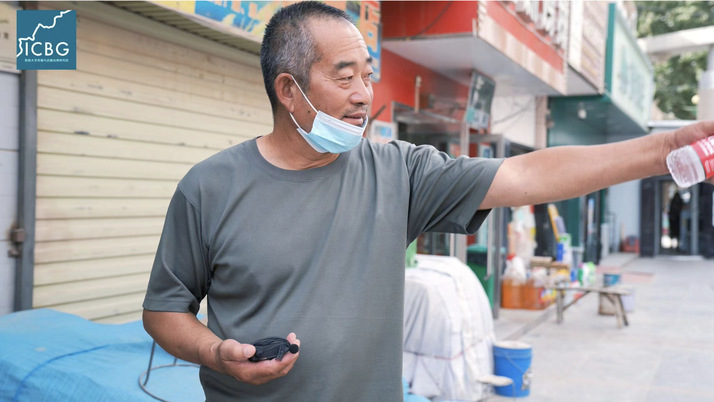
Wang Tiancheng recalls the details of the terrorist attack in the Xingfu Road pedestrian street.
III Life after the Attack
I was treated in the hospital and stayed there for 46 days. I took the injury identification and was identified ten-degree disability, the lowest disability level compared with other victims of this attack. My medical expenses amounted to 20,000 yuan, but the government covered all of them.
My son called me when he learned about this incident, but he was at college then, and I told him that the terrorists had hacked me. I didn't allow him to come back because it wouldn't solve any problem. So I shut down our store and stayed at the hospital while my wife took care of me.
I still have some sequelae now. My shoulder hurts when the weather changes dramatically. I don't have that much psychological trauma because I am brave enough to face most of the difficulties at this age. In addition, I alone dealt with many issues after my father's death. So I have no psychological burden. But my sister-in-law was in the store next to us, and when she saw the terrorists, she was so scared that she ran to a braised pork store without even closing her door. She fell to the ground while running, which freaked her out. Since then, she has developed heart problems and has been taking medicine. She still dreams about the horror scene. It's been ten years since the terrorist attack, but I can still feel the horror whenever I recall it. To be honest, we were scared. But now that the attack had happened, the first thing we should do was to stay calm and be brave and try to fight back. It is the mentality I always uphold. We must not fear terrorism.
IV Perception of the Terrorist Attack
Those people (terrorists) were killing innocent people. Their original plan was to attack between 6:50 p.m. and 7:00 p.m. when the students left school. There are several schools here, including secondary and elementary schools, and there's a lot of traffic when school is over. Their original targets were those students coming out from the pedestrian street after finishing their classes that day. Young students are particularly vulnerable. But they were exposed by the auxiliary police (Turghunjan, who was killed) before the students were released from school. When their evil intentions were uncovered, they launched the attack immediately by hacking pedestrians and shopkeepers in the street. For those store owners, if they took a stick or a mop in their hands, the terrorists would not dare to hurt them. Those who were unarmed would be the targets of the terrorists.
He hacked me for no reason. This was so unreasonable. On a personal level, I had no grudge against him. However, on a social level, he was conducting terrorist activities. We civilians always follow the rules and abide by the laws and regulations of our country, so when we were facing a terrorist attack, most of us were defenseless with no weapons in our hands. I would have defended myself if I had a weapon at the time. It is a pity that I was not able to fight back. I had tried to fight back with a chair, but it was not powerful enough.
If you didn't fight back, you would be killed. Back then, the terrorists had already hacked and taken down a dozen people, and if I hadn't picked up that chair and resisted, I might have been killed. Most people they attacked were the old, sick, disabled, or women. If someone were standing with bare hands, the terrorists would attack him with no mercy. They would even chase after you. But they would immediately leave if they found you were holding something in your hands. Put it plainly, they tended to attack the weak but feared the strong. They also avoided fighting with people with weapons in their hands, so as I said, they (terrorists) also cherished their own lives. But you would be the target of terrorists if you did nothing to defend yourself. Any resistance could probably save your life. They would immediately leave if they found that they couldn't kill you that easily.
We have lived here for decades and have never faced a terrorist attack. It was our first time, so everyone was simply unprepared and panicked at the beginning. At that moment, if there was someone who could organize the crowds, the terrorists could never get their way. Simple weapons could be found in every store to fight against the terrorists, and if 10 to 20 people tried to fight back with weapons, the terrorists would be scared away. But there was no one organizing us. We had been doing business separately and minding our business for a long time. It was hard for us to have someone stand out and organize us. After all, the first thing ordinary people could think about was to hide in a safe place as soon as possible. If someone was organizing us, and everyone had weapons in their hands, could they (the terrorists) get their way? Never! They are also human, and they are also afraid of death.
The government took various measures to deal with all the relevant issues after the attack, and the culprit was punished by law.
02
Tursun Talip
Father of Turghunjan (deceased auxiliary police officer)
(Mr. Talip was interviewed in Uyghur, and below is the English translation.)
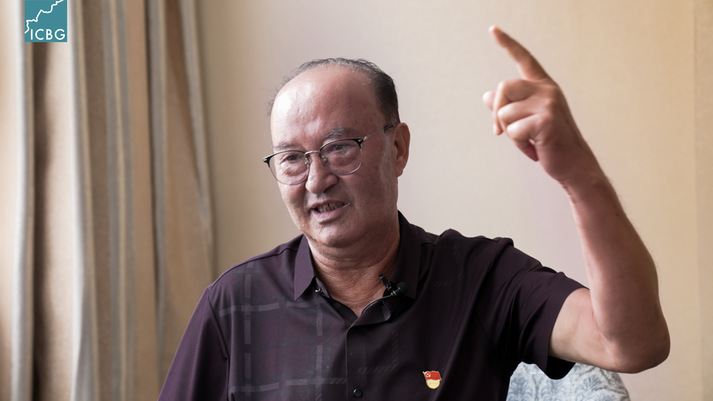
I Personal Background
My name is Tursun Talip. I was born in 1956 and am a native of Yecheng. In 1976, I enrolled in Xinjiang University and returned to Yecheng after graduation in 1979. I was assigned to the Yecheng Education Bureau and worked there for almost 38 years, and I have worked in four different departments in total. Now I am retired.
I used to have five children, but now only two sons and two daughters left. The child who died, Turghunjan, was the second child and the eldest son in my family. My two daughters have chosen the same career as me and have become teachers.
As for my son Turghunjan, he failed to enter the university after high school, so he went to the Kashi Agricultural School. After graduation, he started to work as auxiliary police officer in Yecheng Traffic Brigade in 2006.
My son enjoyed his job as a police officer and worked very hard in the Traffic Brigade. He was commended many times, brought many awards back home, and applied to join the Party. My son was respectful to my wife and me at home. He had never made us worry. When my wife was sick and couldn't see very well, he took great care of her every time he came home. When my son first started this job, he was not posted on Xingfu Road, but later my wife was in poor health, and he wanted to work closer to home and take care of his mother, so he was transferred to Xingfu Road, which is not far from us. But he died on duty a few days after he was posted there.
II Recalling the Incident
I was working at the school on the day of the terrorist attack. At around 19:00 that afternoon, I received a phone call saying I should inform the faculty and staff to stay put and close the school gate as soon as possible. Then I learned something had happened at the market's entrance (Xingfu Road pedestrian street).
My heart missed a beat as I soon realized that my son was on duty there, and I thought, God, please keep my son safe from harm. I was so worried. Then I immediately called the head of the traffic brigade and told him that my son was there, and I had to go over. Then I got on my motorbike and prayed for my son on the way. Upon my arrival, the attack was over, the crowd had been evacuated, and the police had begun to clean up the scene. At the scene was a police officer of the county public security bureau. He stopped me from approaching. I told him I was Turghunjan's father, and my son was on duty there.
There were many police officers at the scene, and I asked them about my son's condition. Then a female officer came over, took me in the car, and headed to the hospital. On the way, she asked me if I was Turghunjan's father. I hurriedly said yes, and she told me my son was in the hospital. We went to the hospital but did not find my son in the treatment room. Then the captain of the traffic brigade drove me to their office. It was about 22:00. They also took my daughter-in-law, Turghunjan's wife, there and poured us tea. We waited there for a long time, almost for 4 hours (22:00 to 2:00 a.m. the next day), and I had a bad feeling in my heart then. Finally, after waiting for a long time, the hospital informed us that we could come over.
We went to the hospital by car again. After we arrived there, the hospital informed us that Turghunjan had died and taken us to identify the body. The comrades (officers) of the public security bureau took us there. Outside the room, I immediately saw the wounds on my son's neck, and here (shoulder and neck), and there (right arm) ...... The county chiefs were in the hospital. They kept comforting us. When we came out of the hospital, my daughter-in-law, the wife of Turghunjan, immediately broke down. Later, the county chiefs said my son honorably sacrificed for the country's people, and the county chiefs escorted my son's body back to my house.
The county government organized a funeral the next day, and the county chiefs all attended, and the funeral was held solemnly. But I did not tell my wife about our son's death then. She just finished her eye surgery in Urumqi and was resting at my eldest daughter's house, she's in poor health, and my daughter was taking care of her. I did not tell my other children either. Since the tragedy had already happened, I would like to bury my son and deal with all the relevant issues first.
Later I learned that my son was on duty that day, around 18:00, when 7 or 8 terrorists were gathering at the market. They were all youngsters aged about 25. My son went over and told them not to gather at the gate. It was the first time my son asked them to leave. Few of the terrorists walked away, but they soon gathered at the exit of the pedestrian street. My son went up to them and dispersed them for the second time, and they walked a few steps away, but they soon gathered again. So, my son went over to check their IDs, but none of them brought their ID cards. It was then that my son saw that one of the terrorists was carrying an ax with him, so my son was going to take that man to the police station. The Third Police Station was nearby. My son should have called the police station first, but he wanted to take those people to the police station by himself. He said, I am going to take you to the police station, you guys do not bring your ID cards, and I have told you to leave three times, but you guys still don't want to leave. At that moment, one of the terrorists took out an ax, sent a secret signal to his accomplices, and then hacked my son to the ground. My son was still alive, but the other terrorists all came to attack him and finally killed my son.
The original targets of those terrorists were primary school students. They divided themselves into three teams, one was at the gate of the pedestrian street, one was in the pedestrian street market, and one was next to the primary school. Each of them was planning to kill 500 people. However, my son tried to disperse them multiple times, check their ID, and take them to the police station, which disrupted their plan.
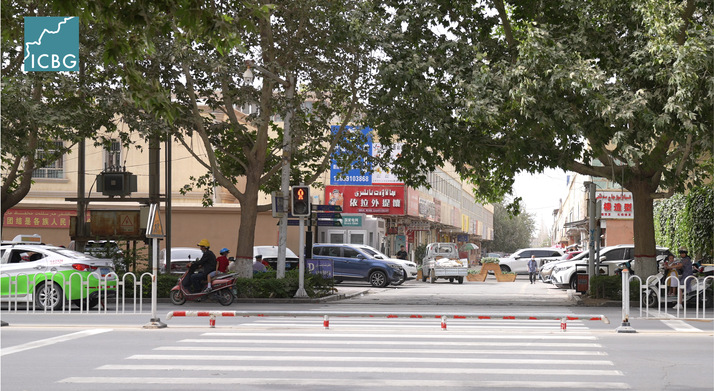
The spot where Turghujan was killed by the terrorists.
III Life after the Attack
When I arrived that day, people were already cleaning up the scene, but I could still see blood on the ground. I went back there the next afternoon, there remained some blood on the ground, and I was sitting there, looking at the blood and crying. All I had in my mind was the scene where my son was hacked to the ground.
I could even hear him cry, "Dad, Dad...". When my son was alive, he liked cars and knew about cars, so when he was assigned some tasks, such as directing traffic and checking vehicles, he could always complete them very well. When he was at home, he always taught us some knowledge about cars. But now everything has gone. There is no one to tell us about all those things anymore.
My other children, Turghunjan's younger siblings, all cried hard when they learned about their brother's death. My wife and my children didn't know about Turghunjan's death until my son had been buried. I told them because the county chiefs came over to commiserate. On hearing the news, my wife sat there and kept crying. It was tough for us parents to bear the loss of our beloved son. My youngest son said: "Dad, my brother did what you have always told us. He is a martyr, and we are proud of him. Death befalls all men alike. My brother's death saved many innocent lives. He has shown his loyalty to the Party and the people. I am very proud every time I think about it."
To begin with, my son was not buried in the martyrs' cemetery but in the public cemetery. We were allowed to choose but decided on the public cemetery near us. The Civil Affairs Bureau in the county erected a monument.
Two years later, in 2016, the State Council recognized my son as martyr, and the Civil Affairs Bureau informed us that we could move our son to the martyr's cemetery, and we agreed. The tomb was designed based on some of our ideas. They built a tomb and a monument and planted some flowers there. It is so beautiful. I went over there this spring and talked to my son by his grave...
The government did an excellent job of comforting and compensating us. The second day after my son died, the county chief told me at the funeral that we could always turn to the government for help for whatever difficulties. I mentioned three things: first, since my son has gone, my daughter-in-law became a widow with a child to take care of. I wondered if the government could help take care of her life properly, such as giving my daughter-in-law some financial compensation and providing her a place to live. Second, my daughter-in-law was unemployed. I hope the government can help arrange her a job. The third is that I was in my 50s and didn't want to work anymore because of the pain of losing my son at this age. Therefore, I hope the government could consider my retirement (before reaching 60).
The county government quickly addressed my first two requests, and a cadre in charge of municipal construction immediately agreed to help us at the funeral. A low-rent apartment with two bedrooms and a living room was allocated to my daughter-in-law and my grandson, and the government hasn't charged us a penny for all these years. The county chiefs also sent my daughter-in-law to take the exam for further training, and then she went to work in a community in the county. My grandson is 11 years old and doing well at school. He visits us three or four times a year. As the child of martyrs, the government provides him with a 2,800 yuan monthly subsidy until he reaches adulthood. But my request for retirement was not accepted, and the county chief persuaded me to stay on the job. He said I was still needed, and my other children could help take care of my wife. Moreover, if I retired and chose to stay at home, I might overthink my son's death. So finally, I agreed to stay on the job.
For all these years, the county chiefs have taken great care of our family. The county chiefs come to our house during festivals every year and ask us if we have any difficulties, needs, etc. There was a time when my daughter got a teaching position after graduating from college, but the school was very far, almost a dozen kilometers away from us. The government helped transfer our daughter to a school close to us because they thought we needed someone to take care of us. We live in excellent conditions, and those cadres working at the grassroots, such as community workers, also visit us occasionally.
Last year, the martyrs office of the county learned that my wife was not in good health. They told us that she could apply for the seniors' allowance as a member of the martyr's family, a new policy issued by the central government. We submitted the documents, and our application was approved. Since last spring, the government has been giving my wife a monthly allowance of 2,820 yuan, which will last as long as my wife lives, and the amount will go up accordingly if the state raises the amount of the allowance in the future. At the beginning of this spring, just three or four days after the New Year, the government arrange a tour of Kashi city for us. We also went to the Third Police Station. The police inspector took us there, and many police comrades came over to ask about our current situation, comforted us, and offered us a pension of 5,000 yuan. Then they took out another 3,000 yuan, saying that is from the county chief. I refused the money and told them that we no longer have difficulties. The government has been helping us and solving many of our problems. But they insisted that we should take the money. In short, we can always feel the government's and society's help and care.
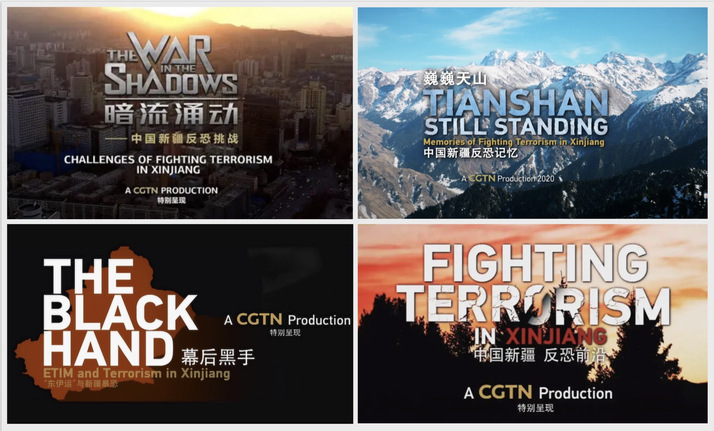
Four documentaries on counter-terrorism in Xinjiang, by CGTN
I also asked my youngest son to become a police officer and serve the people. Although our family was heartbroken by Turghunjan's death, I feel proud of his behavior from the bottom of my heart. My youngest son was still in high school when his brother passed away and went to school in Hetian. When he graduated and returned home in 2014, we all persuaded him to be a police officer. We told him that police is an honorable profession. His brother is a martyr who died for the people, and all the county's radios broadcast his brother's heroic deeds. His brother saved the lives of many children, and we hoped that my youngest son to become a police officer and fight against terrorism! So, he took the police recruitment exam and finally got into the public security bureau of Shache county. Not long after my youngest son went to work in Shache, the chiefs from the county and the public security bureau came to my house during the Spring Festival that year and asked me if there were any difficulties in my family. I said my only concern was that my youngest son was in Shache, which is too far from us. The leaders said they would try to solve the problem, and later our son was transferred to Yecheng. Now he works very close to us and can have his three meals daily at home. As he can be with us every day, and his mother's health is not good, if we need anything, my son can always bring it home after work.
IV Perception of the Terrorist Attack
I couldn't stop thinking afterward that if someone had known about the terrorists' conspiracy in advance, they might not have caused so many deaths, and my son might live. If my son hadn't gone over to question them repeatedly, he probably wouldn't have been killed. My son is now recognized as a martyr, he sacrificed his life for the safety of many civilians, and I am proud of that, but with my son gone, everything is gone.
How young my son was when he died! He had just become a father. His baby was only six months old! His wife was unemployed then, and their family was ruined! Although my son was a very responsible person that day, if he did not go over multiple times to question the terrorists and have their scheme exposed, I have no idea how many innocent people would have died, let alone the original target of the terrorists were those unarmed children in elementary school. If the terrorists realized their evil plan, the consequences would be horrible.
My son, who had been a hard-working person, was just doing his job that day but ended up brutally killed. I want to ask those terrorists: Don't you cherish your own lives? If the government allowed me to see these terrorists, I would tear them to pieces, which would not even ease my hatred. My son was only 28 years old at the time, if not for the incident, he would have been 38 or 39 years old now, and our family would be happy. Since this incident, my daughter-in- law has taken care of their kid and never remarried. I hate these terrorists and separatists, as they have ruined my family. I can't even control myself if anyone mentions the terrorist attack in front of me. I hate those terrorists to the bones!
03
Mehmet Tursun
Younger brother of the deceased Ubulqasim
(Mr. Tursun was interviewed in Uyghur, and below is the English translation.)
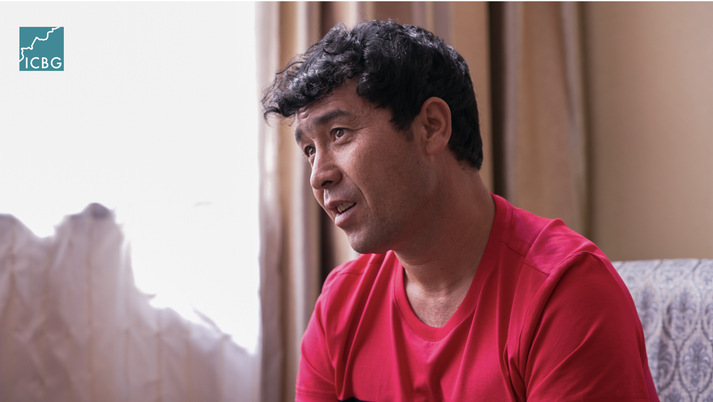
I Personal Background
My name is Mehmet Tursun, a native of Yecheng. I was born in the countryside. My family has four children. I am the third child. Additionally, my family has three adopted children. My father was a security guard, and he passed away in the August of 2017. My second brother died in that terrorist attack in 2012, and the rest of our family is still alive. I got married in 2011, a year before my brother's death.
II Recalling the Incident
On February 28, 2012, I was working in the bathhouse. After work that day, it was at night when we received a call informing us that something was wrong with my brother, who was in the hospital. My father, sister-in-law, and I quickly ran to the hospital, which was very crowded then. We could not even squeeze into the hospital, so we did not see my brother that night. The government sent my brother's body to our house two days later.
When I arrived home from work that day, I received a phone call from a friend. He was working at a police station and told me something had happened in the Xingfu Road pedestrian street market. They were ordered to get there in no time. But I didn't know it had something to do with my brother. I thought the market might be on fire or something. We went to the hospital that night but were not allowed to get inside as it was very crowded. No one could have expected my brother's death...
My brother worked in a grain & cooking-oil shop in the Xingfu Market (pedestrian street), and he had been working there for six months. My brother was very kind and friendly, and our neighbors always praised him for being hardworking and outgoing. And my brother was very strong and could do the job usually taken by several people. When he worked in that grain & cooking oil shop, everyone complimented him on his honesty and diligence. No matter which customer made a phone call to him, he would ride his tricycle to deliver the goods to their houses. He also got along very well with his boss.
His boss's wife told us after the attack that those terrorists started hacking as soon as they entered the market, and she rushed into the store to hide under the table. Then she saw everyone was trying to hide inside the store, and the terrorists were chasing after them and hacking them. My brother punched the terrorists in front of the store and then was hacked and killed. We were not at the scene, so we learned about what happened from her. After they sent my brother's body back to us, I found three wounds here and there (head, the joining between his shoulder and neck, and left arm). My family cried out when my brother's body was sent back, and my mother cried a lot. My brother couldn't control himself but kept crying. He finally collapsed and got epilepsy because of my brother's death.
Our neighbors were also very angry, and many cried for my brother's death. When my brother's body was returned, two or three neighbors helped carry my brother's body to the yard on a stretcher and helped clean and rest my brother's body in the coffin. They repeatedly fetched water from their houses to our yard, which was heartwarming.
III Life after the Attack
5 or 6 days later, the government sent us consolation money of 660,000 yuan, my sister-in-law and her children received 600,000, and my parents received 60,000. After all, my brother had his own family. His wife and three kids needed support when he was gone. The government gave us compensation, but money can never measure and ease our pain, as no amount of money could bring my brother back.
Those terrorists are absolute monsters. I don't know how they were raised. I am outraged when I think of what they did, and I believe everyone can feel the same anger as me. We used to live a good life and have much to look forward to. But after the incident, our family was like a train suddenly pulled off the track, and everything was gone at once.
My niece and nephews were all students in Yecheng. My sister-in-law was particularly devastated by the loss of her children's father and always cried. Later the government arranged for her to work in an elementary school. She tried to work there for less than half a month but soon quit as she could not stop thinking about my brother.
When my mom first learned about this, she cried all the time and didn't say a word until she was on her way to the hospital. Now, whenever it's time for us to celebrate a festival, my mother always says it would be good if Ubulqasim (my second brother) were there. Our family always sighs when they recall (this incident), and my mother has been depressed since then and has lost a lot of weight.
My younger brother is 19 years old. When the incident happened, he was a 9- year-old elementary school student and became epileptic as he was too young to bear the pain back then. Now he can barely leave our house, and sometimes, when he goes out, he will fight with people. He rarely speaks or opens his mouth, but he keeps saying: it would be fine if my brother were here...
My father was the most devastated. He was always in tears, crying all night long. Parents are always willing to do anything for their children. It was tough for my parents to bear the loss of their beloved son. As soon as we finished dealing with the funeral and other things, my father became sick, and his health worsened over the next three years. We took him to a hospital in Kashi and learned that he had a tumor in his heart. After that, he liked to go out on his own, visit my brother's children at school, and just see and talk to his grandchildren. He went to the school every two days, but we couldn't accompany him because we had work to do. My dad kept running back and forth for five or six years, and his health worsened. Finally, in August of 2017, when visiting his grandson, he suddenly felt unwell and passed away. My dad had lived a hard life and worked arduously for more than 40 years. He joined the Party in the 1970s, but even in his last days, he couldn't figure out why there was a terrorist attack.
My brother had three children. The oldest son has reached adulthood, finished college in Kuerle, and got an internship there. The second son has not yet entered university but is performing well in school and can speak several languages. My niece is the youngest. Unfortunately, she lives with her mother after my sister-in-law remarried, so we can barely contact her. I heard that she is in Hetian, but I don't know much about her current situation. So his three children are scattered in different places, one in Kuerle, one in Yecheng, and one in Hetian......
This incident had a tremendous impact on my brother, my family, and the whole county. Since I was born, nothing like this has happened in Yecheng. Since that incident,I have passed by that market (Xingfu Road Pedestrian Street) numerous times, but I have never been inside once. I cannot stand to be there again. The same goes for my family. My family members will go to the grave if they miss my brother.
IV Perception of the Terrorist Attack
This incident has brought us so much harm that we are still in pain and anger today. It ruined my sister-in-law's entire family. My dad was in constant pain and eventually passed away. I always feel great anger, and I would like to meet those terrorists who killed innocent people indiscriminately, and even if there is no way I can meet them, I just want to ask them: on what grounds can you kill those who have no grudges against you and those you don't even know? How could you do this? Because of you, my father passed away, and my mother hasn't smiled for years. My brother was a healthy boy, but you drove him into epilepsy. Everyone in our family has suffered a lot because of you over these years! Don't you have parents of your own?
I want to meet these terrorists and ask them why they did it. They gathered together, came up with some evil idea, and created a terrorist organization, but what they finally brought us was a disaster. You can do many things, but certainly not kill people or carry out terrorist attacks. If our family members died because of an accident, such as a car accident, we might slowly accept the fact, but we can't accept that they died in a terrorist attack.
These terrorists must have their own families, parents, wives, children, and lands to be farmed at home. Now that these terrorists have died, who will raise their children? I guess the government will take care of their children in the end.
In the past, people could go anywhere they wanted. They could earn money and make their living everywhere. But because of these terrorists, the situation in Xinjiang had turned worse. It was very chaotic those days after the attack in Yecheng. Not only was my brother killed by the terrorists, but other innocent people lost their lives, and these terrorists even wanted to kill children. They had ruined our happy life for no reason. Those people in the market died unjustly. People here have learned what terrorists are and will not let the same thing happen again. Many of my friends are police officers, and we all hate those who commit terrorist attacks.
04
CHEN Jizhong
Store owners on Xingfu Road, Yecheng, Kashi
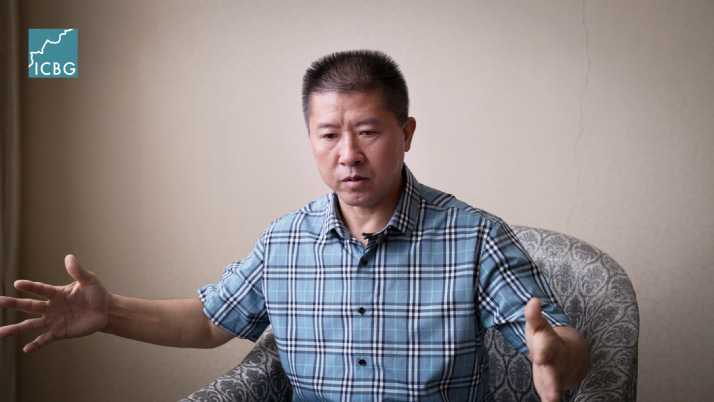
CHEN Jide
Store owners on Xingfu Road, Yecheng, Kashi
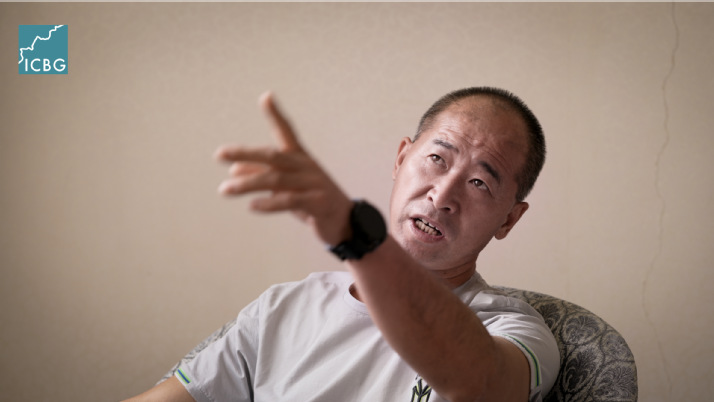
I Personal Background
CHEN Jizhong
My name is CHEN Jizhong. I am 48 years old, and my hometown is Deyang in Sichuan. My family was poor, so I went out and started to work in Tibet. In the winter of 1992, there was no work for me, so I came to Yecheng. At that time, my relatives were farming in Yecheng and introduced me to work with someone they knew. So I came to Yecheng through Xinjiang-Tibet Highway Route 219. Since I had learned to cook in Sichuan, I got a job in a restaurant here. My best dish was braised fish, and I am good at cooking braised crispy fish skin.
My salary in the 90s was not bad. Initially, I was paid more than 100 yuan a month, which later rose to 300. My wife is from Mianyang, Sichuan, and my oldest child is now 19 years old and Institute for Communication and Borderland Governance, Jinan University
Victims and Survivors of Terrorism in China:An Oral History has just passed the college entrance examination. We also moved our household registration to Yecheng. My uncle is the only remaining relative in our hometown, as I have brought my parents here to live with me. They think Yecheng is a nice place, and I can be by their side and take care of them.
I came to Yecheng and have stayed here since 1992. In 1995 or 1996, I started my own business and tried selling vegetables and fruits, opening a brisket pork store and a grain & cooking-oil shop. I started a fishery company of my own in 2010. In 1996 or 1997, I opened a shop by the back door of Xingfu Road pedestrian street. It was a one-story house, and the rent was more than 2,000 yuan a year. Later, the one-story house was demolished because the new pedestrian street was to be built. I borrowed some money from friends, bought a storefront then, and have been doing my business there since then.
CHEN Jide
My name is CHEN Jide. I am 46 years old and was born in Deyang, Sichuan Province. I am not well educated and didn't continue my studies after the fifth grade. My family was too poor to support my education. I came to Xinjiang when I was about 15 or 16 years old. It was in the second half of 1991. Back then, most of the youngsters in our hometown would prefer to work elsewhere, and there was an old cousin who worked in Xinjiang. One time I met and chatted with him when he was in Sichuan, then I followed him to Xinjiang.
My first stop in Xinjiang was Yecheng. My old cousin was helping his aunt farm here. Initially, I did some odd jobs on a construction site and slowly got through it.
I worked for others for several years. I have been to Tibet and worked in Ali for a year or two. I also have been to Guangdong. I ran a restaurant with a few friends there. But there were times when our cooperation was not pleasing, so I quit and returned to Xinjiang to work with my brother (CHEN Jizhong). He was working for others then, but later, he began to run a grain & cooking-oil shop. I can't remember how many years I had worked for him.
Then the new Xingfu Pedestrian Street was built. We rented a storefront and started doing business there, selling fish and chicken. I can't remember exactly in which year I started my own business. Anyway, my life has been stable since then, and I am now settled in Yecheng and have one child.
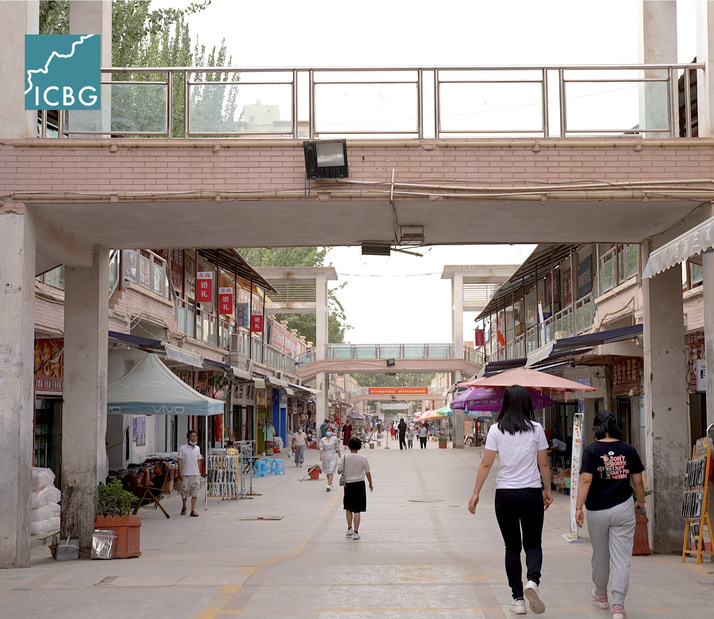
The picture shows the overbridge in the pedestrian street of Xingfu Road, where Chen Jizhong confronted the terrorists.
II Recalling the Incident
CHEN Jizhong
It was in the afternoon, and the classes at school were not yet finished. I played cards with a few friends in my shop on Xingfu Road. While playing, we heard some people saying that people were hacking others at the back gate of Xingfu Road, and it was very chaotic, but we didn't know what was happening. At that time, many people rushed from the back door of Xingfu Road. They were all running. We thought it was a group fight or simply some people got drunk. I did not expect that it would be a terrorist attack. We didn't dare join the fight because we feared that we might break the law if we hurt someone by accident. We feared causing accidental injury.
Our child was also there. He was just a few years old, so I quickly moved him to an attic on the second floor, and we got some stuff to block the stairway. We did that because if they (the terrorists) came at us, we could keep them downstairs. We could also throw things down from upstairs to hit them. And the stairway only allows one person to go up at a time. So once the stairs are blocked, it would be difficult for the terrorists to go up.
I came out after settling my child and saw the terrorists with machetes. There seemed to be two or three of them. They were walking back from somewhere at the front half of Xingfu Road. One (terrorist) should be right under the (Xingfu Road) overbridge with a machete in his hand. We did not know whether the terrorist was in our front or behind us, and the roads were all connected, so we did not know where the other terrorists were. We were all afraid.
Almost ten people were at the scene, some were vegetable sellers in the market, and we were holding wooden sticks. I grabbed a fish net in my brother's store with a net at one end and a steel pipe attached to it. I ran to the front with my brother (CHEN Jide). We were a few meters away from the terrorist. A person behind us did not hold anything in his hands. As soon as he saw the terrorist, he immediately turned his head and ran toward the county government. We could not block the terrorist's attack in the front, so we began to retreat. And I realized that we could not just escape blindly. Other terrorists might have been hiding somewhere.
We were scared, so we ran to the yard of the county government as well. We were scared when we saw the terrorist with a machete in his hands. People who ran slowly were hacked, and there was blood everywhere. We were agitated when we saw the injured. Then, we realized that things couldn't go on like this, and we must defend ourselves, take the terrorist under control, and not allow him to harm more people. When we came out of the county government's courtyard, the terrorist was smashing the door of a store. They smashed every door and glass with machetes. We also saw those who had been hacked to the ground. They (the terrorists) hacked one store after another. They smashed the glass doors of several stores and even hacked those roller shutters open. Anyway, they (the terrorist) hacked everyone they saw and would chase after those who were trying to run away. If someone hid in a store, he would hack the door open.
A beef noodle shop owner was hacked when he pulled down the roll-up door. I cannot remember clearly that it was the owner's shoulder or leg that the terrorist hacked at. But if he had closed the door a little later, he might have had his leg hacked off. It was chaotic, and people were crying everywhere, which sounded horrible. At the scene, some women and children were frightened and cried out. After we ran to the scene again, we used mops, wooden sticks, and fish nets to fight the terrorist. We first used fish nets to trap a terrorist, grabbed his machete, and held him down on the ground. Then, we were no longer afraid because we joined hands and had him under control.
The terrorist had no expression, and his eyes were dull and still at the time. The scene was so chaotic and noisy, so we didn't hear what the terrorist shouted. Two or three minutes later, police officers came to the scene. They controlled a terrorist first and arrested another. Then they took the terrorists away. We got minor bruises while fighting the terrorists, but no one had serious injuries because the terrorists were outnumbered.
After the police left, the scene was covered with blood. Whenever we found a store where someone had been attacked, we rushed in and tried to save people.
Someone was hacked in a cold noodle store, so 4 or 5 of us directly sent him to a car heading towards the hospital. And we went back to shut our stores down immediately and went home.
The police later asked all the store owners to go home and cordoned off the scene. We later learned that the terrorists were planning to carry out attacks at the end of the school day. But a police officer found those terrorists carrying machetes and shouted. The terrorists panicked, so they started the attack immediately, and the police officer was hacked to death.
CHEN Jide
My brother's storefront was right by the entrance of the vegetable market on the pedestrian street, and I was in a store by its side. I think it was at noon (the interviewee got it wrong, and the incident happened in the afternoon), but I can't remember the exact time. I remember I was in my store selling fish, and I saw many people running and heard people shouting: "Murder! Murder! Run!" But as we had lived and worked on Xingfu Road for a long time, I did not escape. Instead, I ran to the intersection to see what was happening, and my mother and daughter-in-law stayed in the store. Everyone was running, and I realized that things must be serious. Then I saw two people holding axes (standing in a row) and walking ahead, and they were not far.
The second time I went out, I saw two people (terrorists), but I can only recall the features of one of them. He was at a young age and was carrying an ax with a long hilt. These two terrorists were coming from the other side. But they were not as bold as people might think. They didn't dare to come to attack me even though I was just a dozen meters away because I was holding a steel pipe.
When they came to me, I saw one of them go into that cold noodle store right across my shop and attack the people there. But I could not see what was happening inside and could only hear the loud noises and screams coming out. We hadn't experienced a terrorist attack before and thought it was a robbery, and we didn't realize that they were terrorists. I was shocked and confused. I've never seen a scene like that before.
Another terrorist was standing outside that cold noodle shop, right in the middle of the road. Our store was next to the gate of Xingfu Road, and he was standing by the gate. I was only about 10 meters away from him. I stepped back when I saw him holding an ax, but he came at me immediately.
I turned around and hit him with the steel pipe. It was below the first overbridge on Xingfu North Road. I hit right on the terrorist's head, and he fell. Then someone came to help me. A few minutes later, many people surrounded him while he was lying on the ground. He was captured on the spot.
I did not see the terrorist attack in the street. When I returned from the overbridge, I did not notice what had happened on the road. I was particularly panicked after taking the terrorist down. I just wanted to leave the scene as soon as possible. Because something terrible had happened, the first thing that came to my mind was to leave. I was in no mood to know what had happened to others.
My wife and children did not see the terrorist attack. They were all in the store with all doors closed. After returning to them safely, I took them home immediately.
III Life after the Attack
CHEN Jizhong
After the incident, I couldn't fall asleep at home and didn't dare to go out for a few days. There was no one in the market those days. No store was opening, no one shopped, and no car was running on the road. It was all empty, and everyone was afraid. I had sleep problems and suffered from fear for one or two years. It took me a long time to put that behind me. I think it was not until 2015 that I could finally move on.
My daughter went to school on Xingfu Road. I learned later that those terrorists planned to carry out the attack when the school was over that day. After the incident, we always had our daughter accompanied by two people on her way to school. Each of us would carry a wooden stick in hand. We had a strong sense of defense and were afraid that terrorists were coming from somewhere again. In the past, children came home from school on their own, but now parents were required to escort children to school.
It's been ten years, and I hope the same thing won't happen again. This is undoubtedly what everyone wants. The security in Xinjiang has improved in all aspects, and the people can live peacefully.
The policies in southern Xinjiang are very good, such as tax incentives and related business loan policies. Now we don't even need collateral for loans. When we needed to borrow money in the 90s, we had to provide guarantees and collateral, and it always took us a while to get it. No one would be sure about how long it may take. Now the government provides us with renting incentives. In the 90s, we needed to pay taxes and business administration fees, which may amount to dozens, a hundred, or even more than two hundred yuan. These fees are waived now. There are no business management fees anymore, and the self-employed do not have to pay taxes. The policies of our country are very supportive.
In the past 30 years, Yecheng has undergone tremendous changes. The urban construction in the past two years has been carried out very well. Many roads have been built and repaired, and many trees were planted. When we first came to Yecheng, there was not a single high-rise, only a few five or six-story ones. But now the situation has changed considerably. In the 90s, the means of transportation mainly were horse-drawn carts, and dirt roads or gravel roads were everywhere. Now we have tarmac and cement roads. In addition, urban landscaping is gradually improving. Many parks were built this year, and many people here go to the parks in the evening to relax.
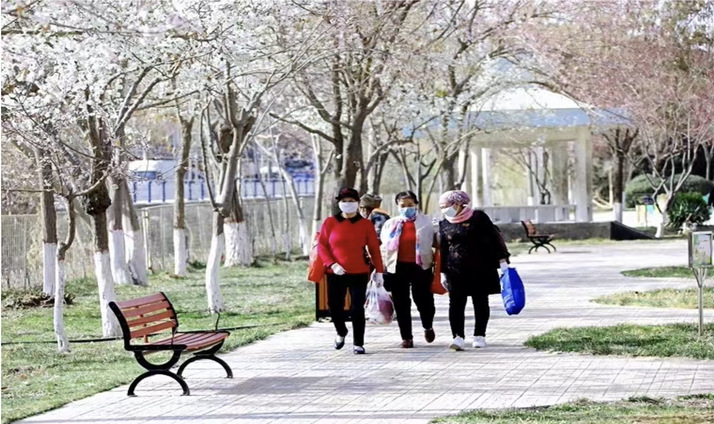
The Farmers' Leisure Park in Yecheng, Kashi Region, Xinjiang.
[Photo originates from: https://mp.weixin.qq.com/s/3Wa2sunbUytQupWNbj2VRQ]
CHEN Jide
I was shocked and confused that day, and my legs were shaking for a few days after that incident. But my legs didn't shake when fighting against the terrorists. It may be a natural body reaction, as I was trying to protect myself. There was a man I knew whose wife died in the cold noodle shop. The man is still alive. But I have not seen him for a long time. I don't know where he is now.
I did not know it was a terrorist attack because we had not seen one before. I had no idea what was happening and thought it should just be a robbery. After knocking down the terrorist, I was so scared that I left the scene. We went back home and worried about whether we had broken the law. We did not go to our stores, not even leave our homes, in the next day or two. We simply did not know what had happened. On the third day, we went to the scene and were terrified, asking passers-by what had happened.
I was not afraid of those terrorists but that I might have broken the law, as we knocked one terrorist down. I was particularly scared when I was at home and heard the siren of the police cars because I didn't know whether the terrorist was dead or alive, and neither did I understand why he carried out the attack. He was taken away by the police. I knew I had knocked him down and was afraid I might have accidentally killed him. People would be criminally responsible if they hurt others in that way. When the police came to investigate us and asked us what happened, we were afraid to tell them the whole thing, worrying that it may violate the law. We didn't know he was a terrorist as we didn't even know what a terrorist is like. Later, when I knew I didn't break the law, I gradually calmed down. As I said, my biggest fear, in this case, was not terrorism but breaking the law. I found that the terrorists are not as tough as people may think. It is not difficult to fight against them if you are not afraid. We can fight them back.
The attack particularly affected our business, and no one dared to come there for a long time. Now it's much better. I think I am much calmer than before. Because the goal of terrorists is to kill people, For the sake of my life, I will fight them to the end, or I will die.
05
Semet
A police officer who was at the scene
(Mr. Semet was interviewed in Uyghur, and below is the English translation.)
I Personal Background
My name is Semet, and I was born in Zepu County in 1986. I passed the college entrance examination in 2005 and graduated from Xinjiang University in 2008. After passing the teacher's test, I became a teacher first. Then, in 2010 I took the civil service examination and became a police officer. Since then, I have been working in Yecheng Public Security Bureau. I was already married when the 2·28 terrorist attack occurred but did not have children.
II Recalling the Incident
At 12:30 a.m. on February 28 (Translator's note: the interviewee got it wrong, the 2·28 terrorist attack happened around 7:00 p.m.), we received an order from the command center saying that there were people stabbing others in the Xingfu Road pedestrian street. We were ordered to go to the scene as soon as possible. A colleague and I were on patrol on the street at the time. As soon as we received the order, we immediately rushed to that small square in front of the pedestrian street on Xingfu Road. The people at the scene came over to tell us that two terrorists were stabbing people inside the vegetable market. Knowing this situation, we and the other two colleagues who were there, a total of four people rushed into the market. We divided ourselves into groups to enter the scene and take unified actions.
When I first arrived at the scene, I saw two motorcycles lying on the ground with signs of hacking. Then, I saw the terrorists attacking people from a distance but couldn't see very clearly. It was my first time dealing with this kind of thing. Before that, I had only been to the scene of traffic accidents and seen the dead and injured in car accidents, but I had never encountered a terrorist attack, so I was particularly nervous.
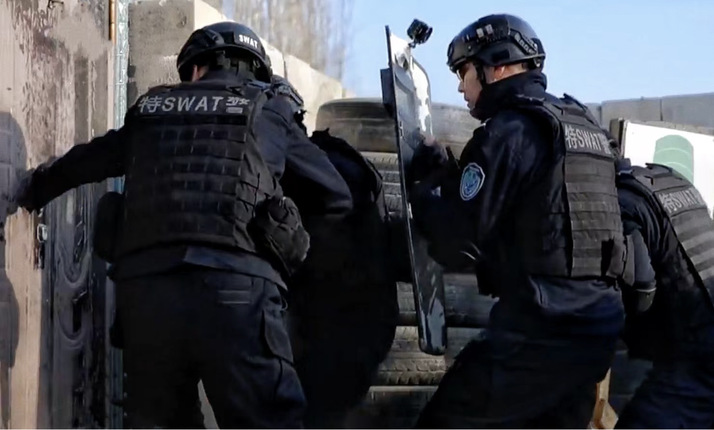
The picture is from the documentary Tianshan: Still Standing - Memories of fighting terrorism in Xinjiang. A SWAT unit is conducting anti-terrorism drills in Xinjiang.
As soon as we entered the market, we saw people lying on the ground who had been hacked and killed, and the terrorists were still attacking people inside. The terrorists saw us and immediately fled in the opposite direction. However, our comrades were on the other side of the pedestrian street, so we surrounded the terrorists. The buildings on both sides of the pedestrian street have two floors, with stairs to the second floor on both sides, and the terrorists began to run to the second floor. Seeing them fleeing, three of us followed them upstairs, while another colleague, our squadron leader, and I quickly went to the stairway right ahead of the terrorists and went upstairs to lay a siege to the terrorists.
As soon as we both reached the second floor, the terrorists were already very close to us, and we were ready to fight. The terrorists immediately came at us. I still remember the scene. They were strangely calm and had no expression on their faces, and they were coming at us with a machete in one hand and an ax in the other, shouting Jihadist slogans.
Our squadron leader's pistol was loaded already, and he fired at the terrorists. Both terrorists were taken down on the spot. The terrorist shot down first fell 8 or 9 meters away from us, and the terrorist charging toward us was shot down only 2 meters from us. Both terrorists held a machete in one hand and an ax in the other. The machete was 30 cm long, and the ax was used to chop meat and bones, almost 50 cm long. Then we gathered the terrorists' weapons, protected the scene, and reported to the command center with our intercom.
The command center then informed us that people were injured at the Third Police Station and asked all the police officers in the market to get there as soon as possible. We quickly went there to send the injured to the hospital for treatment. This terrorist incident mainly happened at the back door of Xingfu Road pedestrian street, but we entered the scene from the front door, which is to say that we were behind the terrorists, so we only dealt with two terrorists. We took control of the scene after that.
Many merchants were doing business in the pedestrian street, and many people were inside the vegetable market when the attack happened. Except for the victim I saw when we first entered the scene, there was blood all over the front and inside three or four stores. But whose blood was it? How did it happen? We did not know because we entered the scene from the front door (behind the terrorists).
When we arrived at the scene, I saw someone brutally killed there. His body was hacked in half. Those terrorists are ruthless. Their deeds were extremely inhumane and brutal. This incident has seriously harmed the social stability of our county, the Kashi Prefecture, and even Xinjiang.
We returned to protect the scene after the injured was sent to the hospital. The criminal police also arrived. We left the scene after taking pictures and identifying the condition of the wounded.
When I was dealing with this incident, the thought in my head was to control the terrorists. But when I recall the incident, all I have in my mind is the hatred against the terrorists. Human life is much more precious than anything else. Why did they want to hack and kill those innocent people who had nothing against them?
III Life after the Attack
I was very busy with work that day. I called my wife in the evening, but didn't tell her about the incident, so she didn't know anything. A week later, I told her in the morning, and she said, I didn't know about it. My wife is a teacher, and I usually don't tell her about my work. I told her because there were news reports covering the terrorist attack. Still, I didn't mention the specifics because I feared she would be terrified. If I told her that the terrorist was carrying a machete in one hand and an ax in the other and was coming at me, it would only scare her.
I have never thought of giving up this job, even after this incident. I grew up dreaming of becoming a police officer. Many of us wanted to be police officers when we were still boys. I love this job. I was a teacher at the very beginning, but later I thought I still needed to try for my dream, and then I took the civil service examination and became a police officer, which is indeed an arduous job, but I like this job. I regard it as a very sacred career. Some people must do this. I have never regretted being a police officer. We police will always encounter dangers, so we must have great psychological quality. My duties include public security maintenance and traffic guidance.
IV Perception of the Terrorist Attack
It has been ten years since the 2·28 terrorist attack, and now I still feel nervous whenever I recall it. I was not afraid but only nervous that day, worrying that we might be unable to handle the incident well. We had police batons that day, but the terrorists carried axes and machetes. But I believed that we could subdue them if a fight were needed. Now we will undoubtedly have weapons with us when we are on duty.
I am nervous when I recall the incident. Dealing with a terrorist attack I had never encountered before was a tense experience. I was not injured. From my point of view, such an incident should never be allowed to happen again, or our people will suffer more, and many families will be ruined. The current stable situation must not be reversed.
I have been involved in the handling of similar terrorism incidents afterward. But before the 2·28 incident, I was constantly dealing with cases concerning public security. I gradually understood later how they (terrorists) carried out an attack, the sources of their ideology, their purposes, etc... I realized that they are engaging in separatism, hoping to establish their regime. It is a pipe dream and is simply impossible.
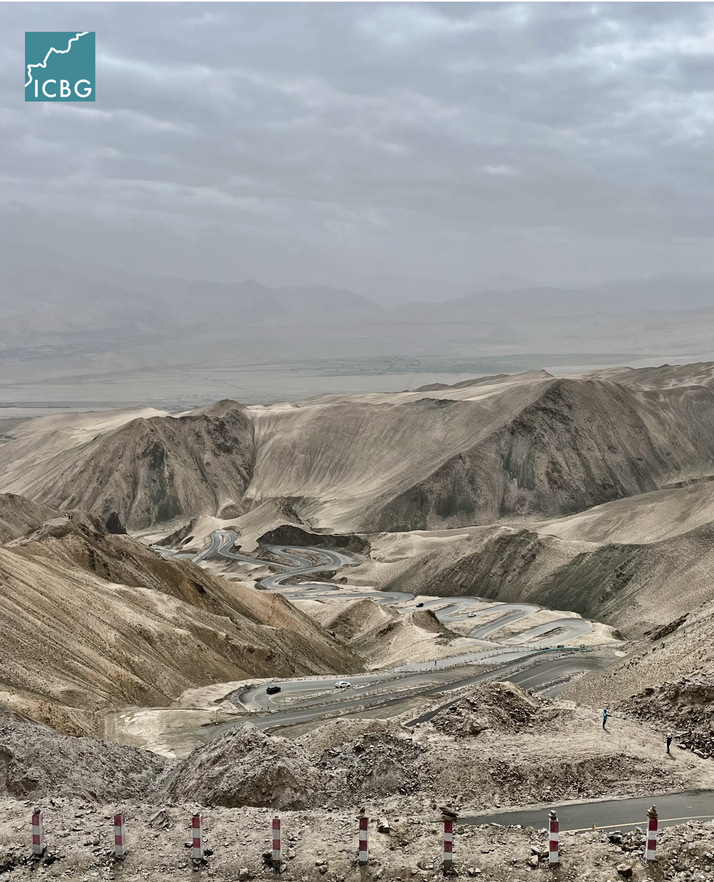
The picture taken in July 2021 shows the Wacha Highway in Tashkurgan Tajik Autonomous County, Kashi, Xinjiang.
Afterword
The 2·28 terrorist attack in Xingfu Road Pedestrian Street, Yecheng, Kashi Prefecture, was one of the terrorist attacks in Xinjiang over these years and a barbaric incident in which several terrorists hacked and killed innocent people randomly and indiscriminately in a crowded market. It has been ten years since the attack. However, when our interviewees recalled it again, we could still feel their hatred towards the terrorists, their fear after finding that those innocent children in the nearby schools were fortunately spared from a massacre and their broken hearts and grief of witnessing their families and neighbors being hacked to death and losing their loved ones.
The interviews were conducted in hotel rooms, and each interview lasted 40 to 90 minutes. For most of the interviewees, recalling the horrific experience they had years ago was difficult. The interview always began after hours, if not days, of psychological struggle. There was a survivor who told us before the interview, I didn't want to talk about it, but I think it is quite necessary to let more people know what happened back then, so I chose to speak out.(ئــەســلىدە دېــگۈم يــوق ئــىدى، لــېكىن ئــەيــنى چــاغــدا يــۈز بــەرگــەن ئىشــلارنــى ھەممەيلەنگە بىلدۈرۈش ئىنتايىن زۆرۈر دەپ ئويلىسام، سۆزلەشنى قارار قىلدىم)During the interview, we were deeply impressed by the tenacity and resilience of those who valiantly fought against the terrorists. Some survivors showed us the scars on their heads, backs, chests, abdomens, and legs left by hacking and explosions, and all of us were overwhelmed! As one survivor has pointed out, this incident brought significant impacts not only on one family but also on the whole county and even the entire region. The case is a lingering shadow and pain in the hearts of many in Yecheng.
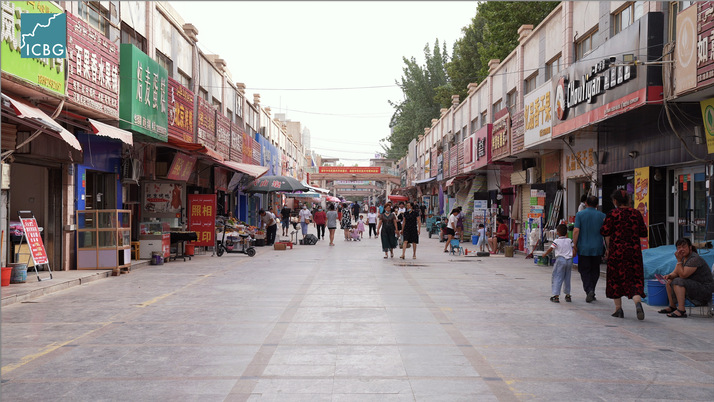
Xingfu Road Pedestrian Street, July, 2022
Ten years have passed since the attack, and some people who have experienced it continue their work and life in Yecheng and even on Xingfu Road. They are still moving forward. The six survivors in this report are all ordinary people. Among them, some prayed for peace while showing their determination and courage to fight against the terrorists, and some expressed their grief over the loss of their loved ones while also showing us their strong will to face reality and life.
After the 2·28 terrorist attack in Yecheng, the media interviewed a few of the victims and survivors, but the focus was mainly on the information of the incident itself. The victims' and survivors' emotions, feelings, and perceptions of terrorist attacks deserve more attention. Oral history focuses on the interviewees' understanding of the entire historical process based on historical narratives. Thus, the oral histories of the victims and survivors of the terrorist incidents complement the media coverage of a particular terrorist attack. Moreover, for terrorism studies, victims' and survivors' oral histories also remind us that while we should focus on the causes and backgrounds of terrorism, more attention should be paid to the long-term damage and consequences of the terrorist attacks.






